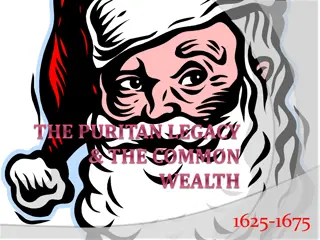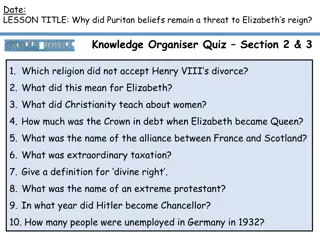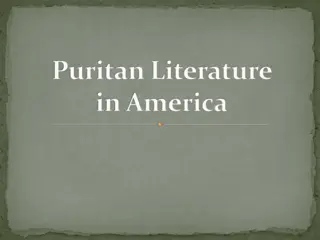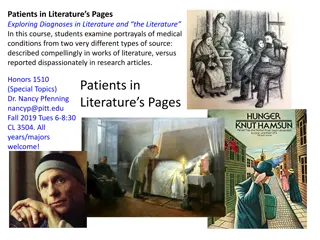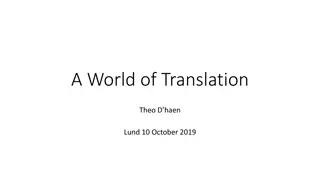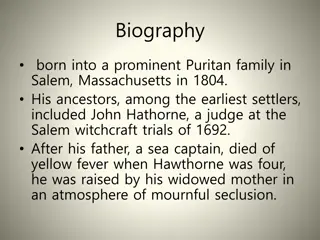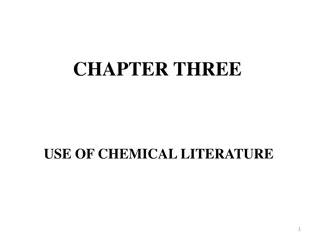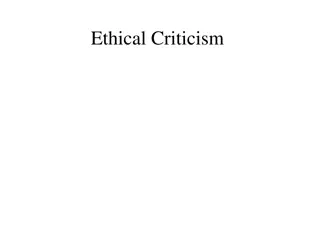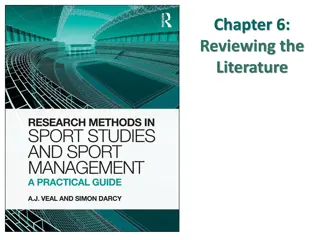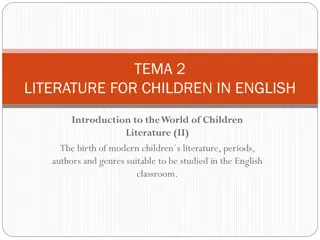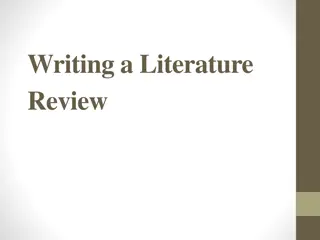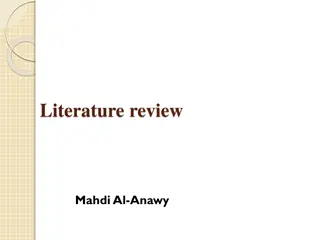
Puritans in Early America: Beliefs, Concepts, Values, and Writing Characteristics
Explore the fascinating world of Puritans in early America from 1620-1758. Learn about their beliefs in Original Depravity and the Elect, concepts like the Supremacy of Divine Will and Theocracy, values of education and hard work, and characteristics of their writing style. Discover how Puritans shaped colonial culture and literature with their deep-rooted religious convictions.
Download Presentation

Please find below an Image/Link to download the presentation.
The content on the website is provided AS IS for your information and personal use only. It may not be sold, licensed, or shared on other websites without obtaining consent from the author. If you encounter any issues during the download, it is possible that the publisher has removed the file from their server.
You are allowed to download the files provided on this website for personal or commercial use, subject to the condition that they are used lawfully. All files are the property of their respective owners.
The content on the website is provided AS IS for your information and personal use only. It may not be sold, licensed, or shared on other websites without obtaining consent from the author.
E N D
Presentation Transcript
Puritans 1620-1758
Literature in Early America Early colonists did not call themselves Americans until the mid 18thcentury Roanoke Island, 1580 Jamestown, 1607 Pilgrims landed at Plymouth, 1620 Puritans founded Mass Bay Colony, 1630
Mass Bay Colony The Puritans were the center of colonial culture Found Harvard, 1636 First colonial press, 1638 First American published book, 1640 First colonial newspaper, 1690
Puritan Beliefs Doctrine of the Original Depravity Adam and Eve broke the covenant with God All people were sinners and damned Doctrine of the Elect Predestination only a select few would go to heaven All sinners must live a holy life you never knew Being good would not change your damnation
Puritan Concepts Supremacy of Divine Will Natural phenomena is the will of God Un-natural events caused by the Devil s witches Theocracy Government controlled by the church The Devil
Puritan Values Education created America s first schools Hard Work Family Life Community Service Self-sacrifice The forest is evil and home to the Devil
Characteristics of Puritan Writing The Bible provided a model for Puritan writing each individual life was a journey to salvation. They saw a direct connection between Biblical events (allusions) and their own lives.
Characteristics of Puritan Writing They used writing to explore the inner and outer lives for signs of the workings of God. Diaries and histories were the most common types of literature. They favored a plain style similar to that of the Geneva Bible and stressed clear expressions over complicated figures of speech.
William Bradford 1590-1657 Of Plymouth Plantation Described hardships of journey to New World; unshakeable belief in God. Plain Style of writing - few figures of speech or metaphors.
Mary Rowlandson 1636-1678 A Narrative of Captivity Story of capture by Native Americans; endured many hardships Saw her story as reflection of Bible stories of hardship- used allusions to Biblical stories.
Anne Bradstreet 1612-1672 The Tenth Muse Lately Sprung Up in America By a Gentlewoman in Those Parts Published in England without her knowledge. Explores religion and personal relationship with God. Difference - Use of metaphor in writing.
Edward Taylor 1642-1729 The Poetical Works of Edward Taylor Differed from other Puritan writers - use of metaphor in writing. Explored how his identity was shaped by God s Grace .
Huswifery by Edward Taylor Make me, O Lord, thy Spinning Wheel complete. Thy Holy Word my Distaff make for me. Make mine Affections thy Swift Fliers neat And make my Soul thy holy Spool to be. My Conversation make to be thy Reel And reel the yarn thereon spun of thy Wheel.
Analysis of Huswifery Examines personal relationship with God. Shows belief in God s grace and rebirth as a saint here on earth. Differences: Use of metaphor to compare life and self to weaving and spinning wheel - avoids the plain style.
Jonathan Edwards 1703-1758 Fire and brimstone imagery. Helped bring about the Great Awakening. Tyrannical pastor - extreme and strict - humans lowly sinners. The last Puritan (Elements of Literature, Fifth Course, 77 ).
Works Cited Dolan, Jennifer. Puritan Literature in America. Henry County Schools, McDonaugh, GA. 2001. PPT.



